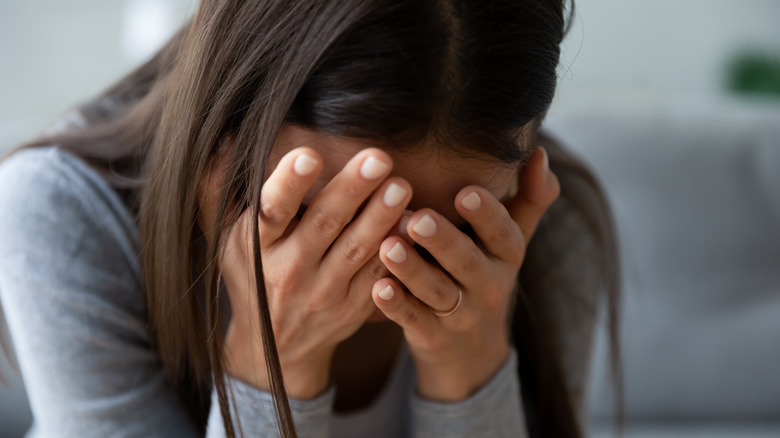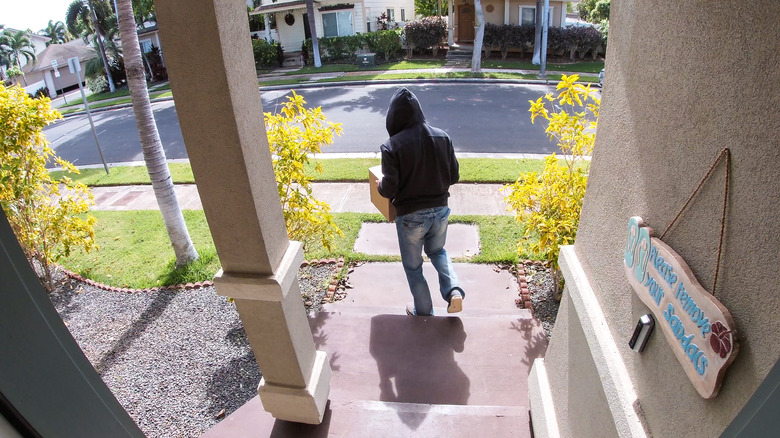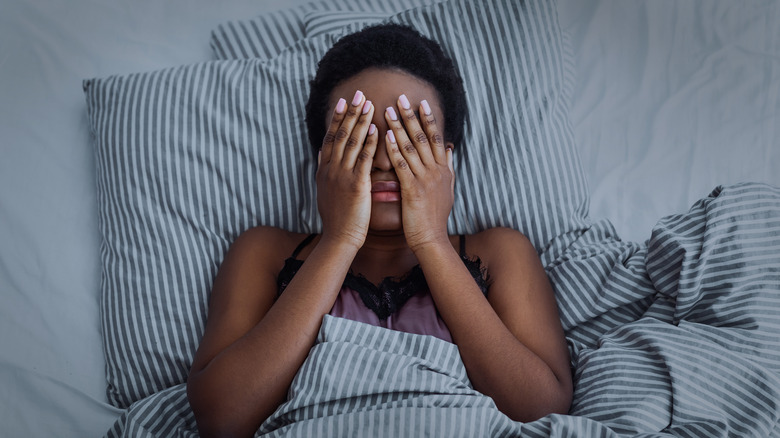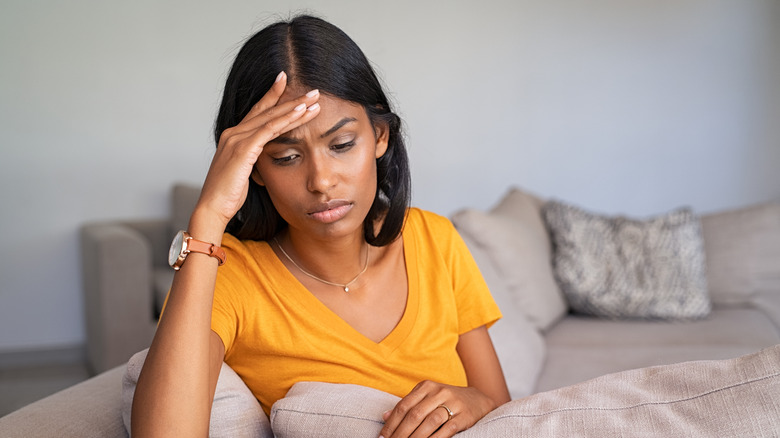Common Causes Of Stress
Stress is serious business. It can make your blood boil, keep you staring at the ceiling in the middle of the night, and leave you wanting to pull your hair out. It can even cause you to experience unexpected effects like hair loss and headaches. Everybody reacts differently to stress, and, surprisingly, how you react to high pressure has a lot to do with your DNA. Different races, genders, and ages experience it in completely different ways. However, there is one thing we can certainly all agree on: No one likes stress.
While stress may be a part of life, feeling it too often can also lead to some serious long-term health problems. Studies have found a link between chronic stress and heart disease, obesity, diabetes, and even "accelerated aging," according to WebMD. To save your health, your sanity, and even some money (after all, anti-aging cream isn't cheap), here's a list of some of the most common causes of stress, how it can affect each person differently, and some of the steps you can take in order to stress less.
Social media
Do you have FOMO? The "fear of missing out" is something many people experience as soon as they log onto social media. While online accounts are a great way to keep in touch with close ones, seeing photos of friends during only the high points of their lives can be enough to stress anybody out. In fact, according to HuffPost, those who have social media profiles report that they are 14% more stressed than those who choose to stay offline altogether. An astonishing 51% of people have even admitted to being addicted to their phones.
With all of the picture-perfect images we see plastered across our news feeds, it only seems to make sense. Yet, experiencing social stress is something that also affects every user differently. A 2015 survey conducted by the Pew Research Center found that single women become much more stressed when they log onto social media. However, before you delete all of your online accounts, there is something stress-relieving about them. The survey also found that the more women connected with their friends through Twitter — a much less visual platform — the less stressed they found themselves feeling.
In the end, it's important to remember that social media was made to help us stay close with those who matter and alleviate the stress of long-distance relationships. (It just may be helpful to stop comparing yourself to photoshopped faces.)
Politics
There's a reason why we don't sit around the dinner table discussing politics with our loved ones. When we disagree, it can be a catastrophe. It can also make those awkward family reunions even more stressful than they needed to be. (You barely got any sleep after making that Thanksgiving turkey, after all.)
In a stress survey conducted by the American Psychological Association in 2017, participants reported that one of the largest causes of stress stemmed from politics, specifically the future of our country. More specifically, 59% of individuals at the time believed that we were at an all-time low in our nation's history. Due to the changing economy, Hispanic people, in particular, reported feeling the most stressed out of any race. In fact, 56% reported experiencing a big sign of stress following the election — laying awake at night worrying about the state of our economy.
While discussing politics is enough to make just about anybody cringe, there's one way all of us can stress less. Get involved in the political process, and get out and vote.
Keeping up with bills
In July 2021, CNBC reported the results of a CreditWise survey showing the No. 1 stressor in America — finances — and are we really surprised? Money is a major component when it comes to our well-being. We use it to buy food, shelter, and pretty much everything else in life that keeps us kicking.
We all need money. Yet, the current cost of living has made it pretty difficult to get for certain people. Younger generations have reported higher levels of stress when it comes to finances due to the ever-changing economy, and for those in minority groups, the stress levels surrounding money can skyrocket even further. Job insecurity doesn't seem to help either. The Economic Policy Institute reported that Hispanic professionals were almost 70 percent more likely to find themselves unemployed than a white person, making it harder to afford everyday bills. Additionally, it was reported that Black people were "twice as likely to face unemployment as white workers." Luckily, various organizations have come together over the last few years to help end discrimination in the workplace in order to help make ends meet for hardworking individuals everywhere.
Your morning commute
If your morning commute is irritating you, you're not alone. Out of all the people who live a ways from work, commuting is one of Americans' least favorite things to do. In fact, the U.S. Census Bureau reported that the time it takes to drive to the office is at an all-time high for everyone. Adding those extra hours onto your work day is causing stress levels to hit an all-time high, too.
As if the stress wasn't already overwhelming, unfortunately for us all, a long commute can take a serious toll on your health. A study published in BMC Public Health in 2011 found that the longer you spend in a car, the less likely you are to be healthy. Researchers suggest that workers who commute have less time to exercise and relax at the end of the day, and this (on top of massive amounts of stress) can quickly turn into heart disease, obesity, diabetes, and other serious conditions (via CDC).
If you're worried your commute could be a risk to your health, there's one helpful way to lower your stress levels while you're stuck in traffic. The University of Chicago found that those who connected with others during their commute had lower a "significantly more positive commute." So whether it's by phone or by striking up a conversation with a stranger on the subway, it may be best to have a chat on your way to work.
Heartbreak
Whether you're going through a messy breakup or a life-changing divorce, becoming single after having a solid partner can be super stressful. In fact, it can be so intense that your heartbreak can cause a medical issue called stress cardiomyopathy.
According to Johns Hopkins, the syndrome occurs when specific hormones — which are triggered by stress — consume the heart muscle at a much faster pace. These chemicals cause the arteries to contract, which can weaken the walls of the heart. Anyone who has broken heart syndrome will experience symptoms such as chest pain, trouble breathing, and dizziness. Though the condition sounds incredibly intense, it can be easily reversible when treated quickly. It's also uncommon to experience it multiple times throughout your life.
While it is important to let yourself experience the emotions that come with heartbreak, it's also important to take care of yourself. To help lower your stress levels (and to keep you from eating an entire pint of Jeni's ice cream), Healthline suggests journaling (don't believe the myths you've heard about journaling), exercising to fight long-term anxiety, and spending time with other important people in your life following a breakup.
Keeping your home clean
If there's one thing we love spending our Saturdays doing, it's housework — said no one ever. Between working a full-time job, being a busy college student, or having children to take care of, it can be extremely difficult to find time to dust. Yet, it's something that must be done, and because of that, stress will always ensue.
Not surprisingly, women seem to have the highest amount of stress when it comes to thinking about housework. According to a study published in PLOS One in 2012, 85% of women were responsible for domestic responsibilities as well as working jobs, which caused an enormous amount of stress in females.
There is a plus side. While thinking about cleaning may be overwhelming — especially if you have company coming over — housework itself is actually a helpful way to destress. One study published in the Personality and Social Psychology Bulletin in 2010 found that women with cleaner homes reported feeling less stressed over the course of the day. "By immersing yourself in a simple, repetitive action like dusting, you're forcing your brain to shift gears away from stress," licensed psychologist Dr. Sal Raichbach explained to Elite Daily. "The task at hand becomes the focus, and it's much easier to let go of that extra baggage, like worry and anxiety." If you think about it, there really is nothing better than seeing your home spick and span.
Working long hours
If you're constantly finding yourself working long hours, you could be burdening yourself with chronic stress. A study published in The Lancet in 2015 found that those who are overworked are more likely to suffer from serious health issues. While the norm is a 40-hour work week, those who work more than 55 hours are more likely to have a heart attack and more likely to have a stroke.
The study also showed the types of people who are prone to work longer hours: those with much lower socioeconomic statuses. Unfortunately, the majority of these workers are people in minority groups. In fact, according to separate research done by PRB, there's a much higher chance that a white person will be assigned to typical working hours.
A work-life balance is important to everyone. Working long hours can easily lead to burnout, so it's important to draw a line when it comes to overworking and self-care.
Moving to a new home
Moving into a new home can feel like a fresh start, but when you start to look around at all the boxes you have to unpack, it can become a pretty stressful experience. Yet, there's a lot more to it than just that. As psychoanalyst Ronnie Greenberg once told The New York Times, moving is "a matrix of safety, so moving is incredibly stressful and people don't realize it."
Where you live can affect your sense of safety, and a new neighborhood comes with a lot of unknowns. Worrying if you can afford a new home can add to the stress. Thinking about scheduling a moving van or lifting heavy furniture by yourself is unnerving. Even going through your own belongings while you're placing them into boxes can trigger upsetting memories. A survey conducted by OnePoll and shared by North American Moving Services found that Americans consider moving to be the most stressful event someone can experience in their life.
To make moving a lot easier, Realtor.com suggests doing a few simple things: pack up one room at a time (so you won't be overwhelmed by all of your belongings) and also to make sure you know exactly what a moving company can help you accomplish when it comes to relocating to a new home.
What you're eating and drinking
Believe it or not, the foods and drinks you find yourself enjoying could be contributing to your stress. For example, while alcohol may seem like a great way to relax after a long day, it could be making matters worse. According to Healthline, alcohol affects the brain by increasing the amount of serotonin in the body — which only temporarily relieves stress. When your serotonin levels do drop, you can feel even more anxious than before. If you repeatedly turn to alcohol, your body's tolerance to it can quickly increase and make it even more difficult to feel less stressed over the long-term.
Some people are even at an increased risk of becoming impacted by alcoholism, too. Researchers from the American Addiction Centers found that American Indians are most likely to turn to high amounts of alcohol, followed by Pacific Islanders and Hispanics.
If you're someone who has a food allergy, you may be an even more stressed individual, too. Healthline reported on one study from the Journal of Psychosomatic Research in 2014 that proved this to be the case. Researchers stated that children and adolescents with a food allergy are much more likely to develop anxiety issues from their stress, and it makes sense. Allergic reactions can be a scary life-or-death situation.
If you or anyone you know is struggling with addiction issues, help is available. Visit the Substance Abuse and Mental Health Services Administration website or contact SAMHSA's National Helpline at 1-800-662-HELP (4357).
Crime
Nowadays, everybody seems to be installing state-of-the-art security cameras around their homes. Safety is an important concern, and anybody who's had their home broken into can tell you that it was a pretty stressful (as well as traumatic) time in their lives.
If you happen to live in a neighborhood where crime is a lot more common, then stress can be something that affects you on a daily basis. According to the National Low Income Housing Coalition, this is most common among minorities, who are more likely to live in low-income neighborhoods. The national Office of Policy Development and Research, an organization that studies crime rates across the country, has even shown that crime decreases the property values of specific neighborhoods — places that only lower income families can afford.
On top of that, many minorities have become the victims of hate crimes. In fact, the U.S. Department of Justice reported that 61.9% of hate crimes were due to race in 2020. Unfortunately, these felonies have the most dangerous consequences when it comes to mental health, too. The American Psychological Association reported that victims of hate crimes are more likely to develop PTSD, depression, and anxiety over any other type of crime committed.
If you or a loved one has experienced a hate crime, contact the VictimConnect Hotline by phone at 1-855-4-VICTIM or by chat for more information or assistance in locating services to help. If you or a loved one are in immediate danger, call 911.
Lack of sleep
Stress could be keeping you up at night. In fact, in a survey conducted by the American Psychological Association, 43% of people reported that they were having trouble sleeping due to stress — and it can be a vicious cycle, too. When you sleep less, you're more likely to find yourself feeling even more stressed than before. The snowball effect only continues from there. Those who experience high levels of stress on a daily basis tend to end up with long-term sleep problems such as chronic insomnia and sleep apnea, according to the Sleep Foundation.
Unfortunately, feeling too stressed out to sleep is much more common among Black and Hispanic people. According to a second survey conducted by the American Psychological Association, these groups spend more time lying awake at night than any other race due to the amount of stress they experience.
In order to feel zen and catch some z's, the Sleep Foundation recommends putting away all electronics before bed, going to bed at the same time each night to put your body in a bedtime routine, and making time to exercise — which can pull double duty when it comes to lowering stress levels.
Prescription medications
We take prescription medications to help us feel better, but surprisingly, some of them may be making you feel even more stressed out than before. While every medication has its fair share of side effects, specific ones can mimic the feelings of anxiety and high stress. According to WebMD, some of these medications include hormone-regulating drugs like corticosteroids, stimulative ADHD medication, pills prescribed for seizures like phenytoin, thyroid medication, and even a few types of treatments for asthma. "There are other medications which indeed often are designed to help manage stress — or help to reduce stress levels — that some people have a paradoxical response and actually become more stressed when they take those medications," Duke University professor Dr. Redford Williams told ABC News.
Simply being prescribed medication can also be overwhelming. "Just the symptoms of the heart racing, feeling light-headed, dizzy and so forth can be very stressful to some people," Dr. Williams said. You should definitely discuss your symptoms with your doctor if you find yourself feeling much more stressed than usual.
The pandemic
Perhaps one of the most stressful situations we all have all shared is the COVID-19 pandemic. Yet, this virus isn't the only epidemic that the world has had since March 2020. Poor mental health and high stress levels have been at an all-time high.
If you're someone who has felt even more stressed than ever, you're not alone. According to the American Psychological Association's yearly stress survey, 67% of adults have experienced an immense amount of stress since the pandemic started. NBC News even reported that the intense pressure has even led to hair loss, weight gain, and body aches (even in those who haven't contracted COVID-19).
Unfortunately, like many other common causes of stress, some people are experiencing the pandemic in much more stressful ways. Many of our country's essential workers are made up of minority groups, putting them at a much higher risk of contracting COVID-19, according to the Centers for Disease Control and Prevention. On top of that, minorities face more barriers when it comes to obtaining adequate healthcare. They're also more likely than white people to live in crowded housing, which poses more opportunities to be exposed to the virus.
We all have to work to live, and if you find yourself having to report in-person throughout the pandemic, there are some precautions you can take. The CDC continues to recommend wearing a mask in public spaces, designating at least six feet in between yourself and others, and routinely disinfecting your workspace to stay safe.
Planning a wedding
There's nothing more exciting than planning your wedding. Yet, it's also known as one of the stressful times in a person's life. Between the financial strain and the immense amount of pressure to plan the perfect day, there's a lot on couples' minds.
Nowadays, American couples are spending nearly $23,000 for their big day, according to research compiled by The Knot. It's quite a bit to invest in a single evening, so brides and grooms are wanting each and every cent spent perfectly. Yet, only one third of them are hiring a wedding planner to help alleviate their stress — and that stress has the possibility to affect their physical health. Brides even reported that 86% of engaged couples have experienced such intense stress that they've lost their hair, had routine headaches, and even developed acne (which nobody wants in their wedding photos!).
Instead of turning to elopement to ease your stress, WeddingWire recommends taking regular breaks from planning and focusing on self-care on the off hours.
All of these causes can lead to chronic stress
Being stressed can be mentally draining, but too much of it over time can be a bad thing for your body, too. One study published in Future Science OA in 2015 even found that chronic stress can cause major changes to your brain.
When you're stressed, your body goes into survival mode and releases a specific kind of hormone that can help prepare you for any circumstance. These chemicals cause breathing to increase and blood to flow faster to muscles, which is helpful when you're in a sticky situation. However, having these hormones surging through your body at all times isn't good for your health. According to Healthline, chronic stress can lead to depression, high blood pressure, heart disease, insomnia, type 2 diabetes, acid reflux, and body aches — and that's only the beginning. Chronic stress can even lower your immune system and make you more susceptible to sickness each and every day.
Unfortunately, stress may affect everyone, but it doesn't necessarily affect everyone equally. According to a study published in the National Academies Press in 2004, Black people are most likely to experience the largest number of stressful events in their lives, and their bodies also react to stress in a much more intense way.
It's important to pay attention to your stress levels. If life gets too overwhelming, take a step back, take a breath, and take the time to take care of yourself.
If you or someone you know is struggling with mental health, please contact the Crisis Text Line by texting HOME to 741741, call the National Alliance on Mental Illness helpline at 1-800-950-NAMI (6264), or visit the National Institute of Mental Health website.















